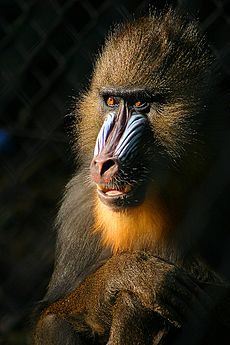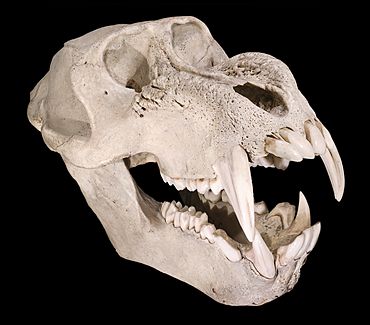Mandrill facts for kids
Quick facts for kids Mandrill |
|
|---|---|
 |
|
| Conservation status | |
| Scientific classification | |
| Kingdom: | |
| Class: | |
| Order: | |
| Family: | |
| Genus: |
Mandrillus
|
| Binomial name | |
| Mandrillus sphinx (Linnaeus, 1758)
|
|
The mandrill (Mandrillus sphinx) is the biggest monkey in the world! It's also one of the most colorful primates. Their skin colors get even brighter when they are excited. Male mandrills usually stay on the ground in forests. Females and young ones prefer to climb trees and bushes. Mandrills look a bit like baboons, but they are actually a different type of animal. They live in big groups, mostly in tropical rain forests.
Contents
What Mandrills Look Like
Male mandrills are very striking! They have an orange or yellow beard. Their face and bottom are bright red and blue. Females and young mandrills have a duller blue face and a light brown beard. Mandrills can live for a long time, sometimes up to 40 years, when they are cared for by humans.
What Mandrills Eat
Mandrills eat many different things. They enjoy fruits, leaves, and roots. They also munch on seeds, nuts, and other green plants. Sometimes, they eat small creatures like invertebrates (animals without backbones).
Where Mandrills Live
Mandrills live in parts of Africa. You can find them in countries like Cameroon, Gabon, and the Congo. They like to live in thick rainforests and forests near the coast. Sometimes, they might visit the savannah, which is an open grassland. Mandrills spend their time both on the ground and up in the trees.
Mandrill Behavior
Mandrills are very social animals. They live in huge, stable groups called "hordes." These hordes can have hundreds of mandrills! Some groups have been seen with over 600 individuals. The biggest group ever recorded had more than 1,300 mandrills. This was in Lopé National Park in Gabon. It's the largest group of non-human primates ever seen! These large groups are mostly made up of adult females and their young.
Male Mandrill Lifestyle
Male mandrills usually live alone. They only join the big hordes when it's time for mating. This happens for about three months each year. There are no known groups made up only of male mandrills.
Images for kids
See also
 In Spanish: Mandril para niños
In Spanish: Mandril para niños
 | Bayard Rustin |
 | Jeannette Carter |
 | Jeremiah A. Brown |









